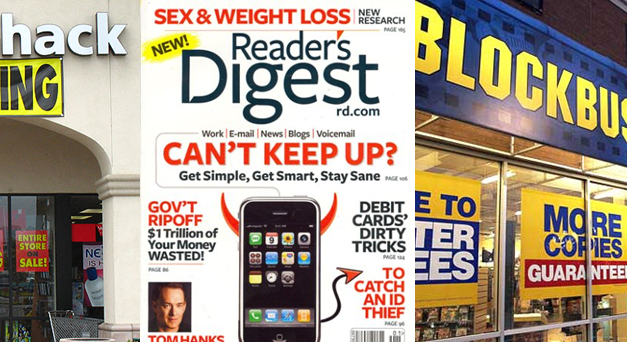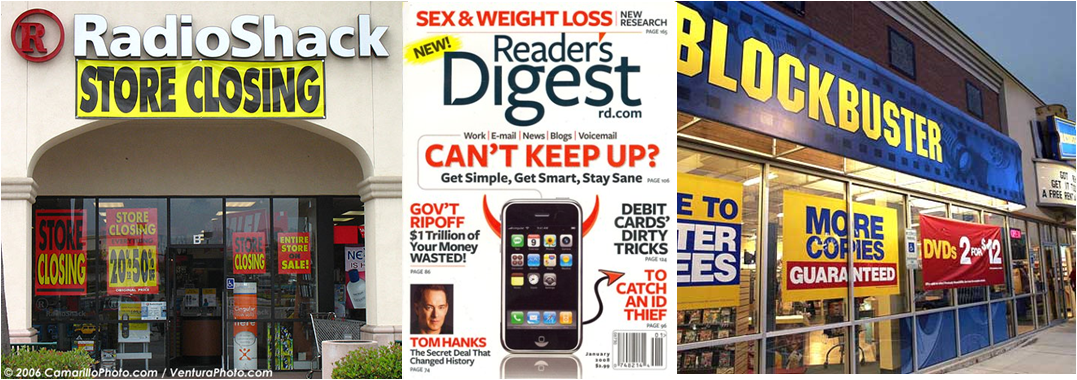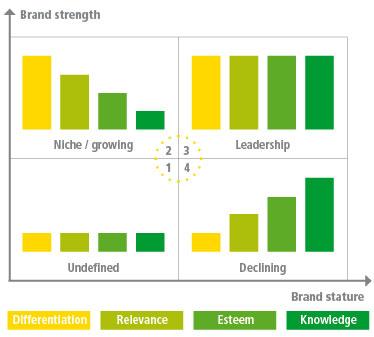

In the dynamic world of brands, 24/7 Wall Street, an online news and opinion operation, has published its annual list of brands that will disappear by the end of this year. The list is based on a review of each company’s financial situation, operating data, current and ongoing value of its brand, and whether the company that controls that brand can sell its assets.

Among the list of ten brands, three long-time heavyweights were perhaps the most noteworthy: Reader’s Digest, Radioshack and Blockbuster. According to 24/7 Wall Street, Reader’s Digest has suffered cuts in circulation and the number of published issues, and still flirts with bankruptcy.
Founded in 1921, Radioshack may be one of America’s oldest retailers, but will likely be taken over by Best Buy through either a leveraged buyout or purchase. Blockbuster’s fate was sealed when technology gave consumers easier ways to watch movies on demand, not only through the internet, but also with cable and satellite video. Blockbuster’s shares have fallen as low as $.24, the company lost $65 million last quarter, and its revenue is continuing to be stolen by rivals like Redbox and Netflix.
Failing to maintain their brand strength has made these brands vulnerable to both emerging brands and discount competitors. All three suffer from a lack of differentiation and relevance. The esteem that Reader’s Digest has built over the years may even be working against it—after being in circulation for 88 years, its brand perception is of a dusty dinosaur that can’t keep up with modern times. Even widely circulated magazines like Newsweek, another contender on the list of disappearing brands, risks being shuttered. Trends in the US publishing industry suggest that Reader’s Digest will soon be extinct in its current form. However, as the magazine is currently published in 50 editions internationally, it could stay afloat by expanding in different regions outside the US. Alternatively, the brand could return to its core idea and find an alternative product or service offer that is more attractive to modern consumers.
Both Blockbuster Video and Radioshack have brand names that reference old technologies and seem to reflect their outdated identities. Like the VHS video itself, Blockbuster’s model of renting movies through physical locations has completely lost its relevance. Its key competitor, Netflix, tellingly incorporates the internet into its brand name. Radioshack has recently begun to rebrand itself as “The Shack” in an attempt to deemphasize its old terminology (see our previous post here). This new name, however, may bring to mind unfortunate associations such as shacks or shanties. Best Buy, Radioshack’s biggest threat, has a much better proposition of quality goods and services for good prices.
All three brands can be classified as having declining brand strength due to low relevance and lack of differentiation. However, their strong brand statures thanks to well-established brand heritage could be their last lifelines. Whether they will be able to use this heritage for reinvention and survival has yet to be determined.

A Labbrand Group Company © 2005-2024 Labbrand All rights reserved
沪ICP备17001253号-3* Will be used in accordance with our Privacy Policy
To improve your experience, we use cookies to provide social media features, offer you content that targets your particular interests, and analyse the performance of our advertising campaigns. By clicking on “Accept” you consent to all cookies. You also have the option to click “Reject” to limit the use of certain types of cookies. Please be aware that rejecting cookies may affect your website browsing experience and limit the use of some personalised features.